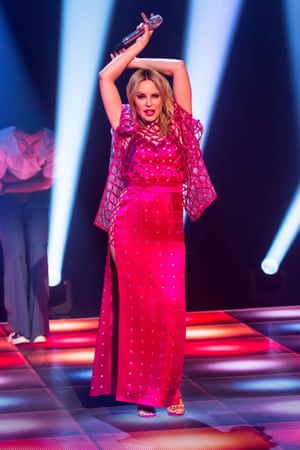Pop in 2020: an escape into disco, folklore and nostalgia | Music
[ad_1]
Pop music has the ability to be more reactive to current events than ever. Advances in technology mean that the famously swift musical responses of rock’s past – Crosby, Stills, Nash & Young’s Ohio, in the US Top 20 within weeks of the Kent State massacre that inspired it; the hastily cobbled-together tributes to Elvis Presley and John Lennon that appeared in the charts in the wake of their deaths – should theoretically look tardy. If an artist is so minded and inspired, they could write, record and release a song that reacts to current events overnight.
In 2020, there was a torrent of reactive tracks released in the wake of the killing of George Floyd and the Black Lives Matter protests: YG’s FTP, Lil’ Baby’s The Bigger Picture, Stevie Wonder’s Can’t Put It in the Hands of Fate, HER’s I Can’t Breathe, the two acclaimed double albums released by the mysterious British collective Sault. Even the Killers reworked their 2019 anti-Trump track Land of the Free to reference Floyd’s death. But if anyone was expecting something similar to happen as a result of Covid-19 – a rash of unexpected new releases ruminating on the strangeness and anxieties of life in a pandemic or sternly admonishing politicians for their mishandling of the crisis – 2020 will have proved a crashing disappointment. They didn’t happen in any quantity, unless you count the well-intentioned but musically ghastly burst of charity singles that proliferated during the spring lockdown, or the equally abysmal anti-lockdown tracks released by Van Morrison and Ian Brown, rock’s own tinfoil-hatted Laurel and Hardy. The music that did appear unexpectedly, from artists keen to put the time on their hands to creative use, largely avoided the subject of the pandemic entirely: Taylor Swift’s Folklore and Evermore, Charli XCX’s How I’m Feeling Now, Paul McCartney’s McCartney III.

If the pandemic impacted on the sound of pop at all, it was in a shift away from melancholy introspection. While Lewis Capaldi had five of the 40 biggest songs of the year by October despite releasing no new music this year, the expected post-Capaldi glut of sad acoustic troubadours never materialised – it was hard not to wonder if labels planning to launch such acts decided to hold off on the grounds that the public tolerance for dejected solipsism had dipped – while Sam Smith’s forlorn album Love Goes noticeably failed to repeat the blockbusting sales success of its two predecessors. Instead, the music that hit big in 2020 suggested an audience keen to retreat from the present into a more comfortable, escapist space, and a wave of nostalgia manifested in a variety of ways.
At its most straightforward, it saw the UK album chart stuffed with old music, to a startling degree. There are always old greatest hits collections in the charts, but this year their presence seemed considerably greater. Christmas singles started charting in mid-November, earlier than ever; by early December, they filled more than half the singles chart. It felt remarkably early to be breaking out Band Aid and Fairytale of New York, but the twin desires of willing 2020 to come to an end and to wallow in memories of less complicated festive seasons past trumped convention.
Nostalgia was a prevalent feature in new music, too. Rina Sawayama’s acclaimed debut album fondly repurposed the early 2000s charts where nu-metal rubbed shoulders with Britney Spears and R&B. What Sawayama offered wasn’t straightforward nostalgia – for one thing, there was a pansexual British-Japanese artist at the centre of it all, something noticeably absent from the early 00s charts – but equally, the torrent of reference points, from Evanescence to Destiny’s Child spoke loudly about a childhood spent in front of MTV. Lady Gaga’s Chromatica and Ariana Grande’s R&B-heavy Positions sounded like retreats to core values – the sounds that in effect made them famous, but that they subsequently misplaced out of a desire to experiment or make more commercially minded albums. So, in their own way, were Taylor Swift’s two albums, both closer to her Nashville roots than the DayGlo synth overload of 2017’s Reputation.
The big pop trend was disco revivalism, which, in various hues, touched everything from Dua Lipa’s Future Nostalgia to Róisín Murphy’s Róisín Machine to Jessie Ware’s What’s Your Pleasure? to Kylie Minogue’s prosaically titled Disco, at one point the fastest-selling album of year. These were largely made before Covid hit, yet disco revivalism made a perfect kind of sense amid the strangeness of 2020. As a genre, disco is lavishly escapist, but the best of it invariably comes with a curious undertow of melancholy. It is music that celebrates the transportive hedonism of the dance floor without ever entirely forgetting that there is something out there you’re keen to be transported from.
A similar mix of emotions fuelled the Weeknd’s brilliant After Hours. Blinding Lights, a 2019 single that stuck at No 1 throughout the first weeks of the UK’s spring lockdown, is, on the surface, a gleeful retreat into 80s pop. There’s a moment at the start where it gives every impression it’s about to turn into a-ha’s 1985 smash Take on Me; on YouTube, someone cut it to footage of Molly Ringwald’s none-more-80s dancing in The Breakfast Club and it fitted perfectly. But it’s topped with a lyrical unease that seemed almost eerily prescient once life in 2020 changed: “I’ve been on my own for too long … I’m going through withdrawals … the city’s cold and empty.”

Likewise, Dua Lipa’s Future Nostalgia was musically euphoric, but events forced an entirely unexpected tone of wistfulness on to its lyrics. Songs about flying away, hooking up and dancing all night felt frozen in a moment before the chaos and stasis of the pandemic revealed itself, a musical equivalent of the posters outside shuttered cinemas, venues and clubs still advertising events that never happened. Rather than the bold repurposing of the past Lipa intended it to symbolise, the album’s title seemed to sum up one of 2020’s weirder phenomena: the feeling that stuff that happened in January and February belonged to a far-off, distant era.
What happens next is an even tougher question than usual. The usual unreliability of predictions about pop’s future is compounded by the fact that no one has any real idea when (or indeed if) things will go back to normal: the gigs and tours booked for 2021 look speculative to say the least.
It is telling that for all the undoubted misery and upheaval caused by the shutdown of live events, some pop artists – particularly women – seemed empowered by being temporarily unshackled from the album/promotion/tour cycle. It is unlikely that Taylor Swift would have made two albums this year had she been required to promote the first one live. Currently in the process of following up her vastly successful breakthrough When We All Fall Asleep, Where Do We Go? when she should have been touring the world, Billie Eilish recently said: “As much as I wished that I had been able to have the year I was planning on having and tour and blah blah blah, we would never have made this album … we would have made something, but it would have been completely different.” Whether the music industry takes notice of this and alters its approach to promotion and touring remains to be seen – either way, a year stuck in the past may have irrevocably changed pop’s future.
[ad_2]
Shared From Source link Arts